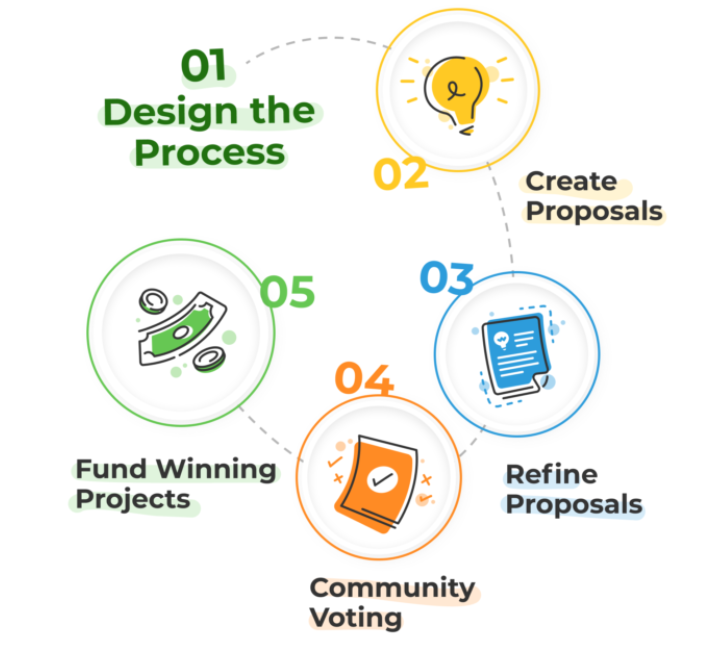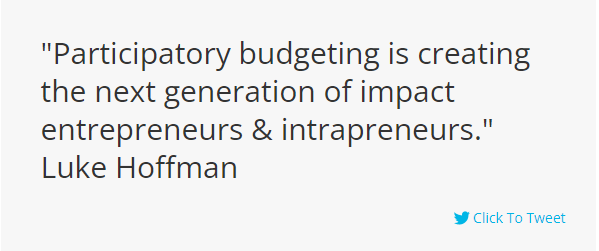
The 5 W's of Participatory Budgeting: Transforming Leadership & Governance By Engaging The People
Participatory budgeting is first a mindset shift - being open to seeing value & opportunities; balancing a commitment to ‘transformative’ methodologies and while not losing sight of what makes your organization successful; becoming ‘unfixed’ in traditional approaches.
Even before the Covid-19 pandemic in 2020, the traditional decision-making process with budgets was stuck. The conventional approach is to assume that budgets are fixed, and so if money is spent in one area, it will be at the expense of another area. For example, if you want new energy infrastructure, you can’t have new hospitals as well. But what if budgets were based on outcomes to be reached, as they were for the moon landing and in wars? What if the first question is not ‘Can we afford it?’ but ‘What do we really want to do? And how do we create the resources required to realize the mission?’ The idea may seem strange and new, but it’s not. [Read: Mission Economy for more.]
To realize missions - massively transformative ones or smaller missions at a local level - we must be innovative. We must use collaborative, mission-oriented thinking while also bringing a stakeholder view into play. We must shift from ‘pyramid’ systems with ‘imposed’ budgets and decisions to ‘flatter’ systems with ‘community and crowd sourced’ + ‘engaged’ budgets and decisions. We can discover untapped value if we fundamentally restructure systems to make them inclusive, sustainable; and, change our mindsets and tools towards inclusivity - ensuring that stakeholders and the decision makers impacting them coalesce to share a common goal. [Read: 11 Attributes of Exponential Organizations]
One such inclusive mindset shift and tool is ‘participatory budgeting’. Participatory budgeting is first a mindset shift - being open to seeing value & opportunities; balancing a commitment to ‘transformative’ methodologies and while not losing sight of what makes your organization successful; becoming ‘unfixed’ in traditional approaches. It cannot be about simply fixing problems distributing existing budget/wealth, but creating value that becomes more of an objective in itself through enrollment in shared mission, engagement, experimentation, trial, and error.
Second, participatory budgeting is a system that can be integrated into any organization. You can do it yourself with technology-enabled software; and, in the OpenExO ecosystem there are coaches, consultants, and advisors-on-demand ready to help empower your leadership journey to engage stakeholders to plan, ideate, refine, vote, and implement ideas & related spending that directly impacts communities.
If you are imagining, managing or building a community to be more #futurproof, we invite you to enjoy this article and podcast highlighting:
- Participatory Budgeting is Powerfully Engaging
- 5 W’s: What is participatory budgeting? Who is using it - from cities to enterprises to public schools...and more? When, where, and how you can start using participatory budgeting in your organization?
- People Closest To The Lived Experience(S) - Not Hippos - Often Have The Best Ideas On How To Improve It
- Participatory Budgeting in Schools Is Creating The Next Generation Of Impact Entrepreneurs
- It Is Powerful When A Previously Unheard Person’s Idea Becomes A Reality That Creates 10x Community Impact
- Enroll Greater Impact by Using Participatory Budgeting for Globally Distributed Teams

Participatory Budgeting Is Powerfully Engaging
Whether managing a $300 or $3 billion, participatory budgeting is a powerful solution for small teams, large enterprises, and public service organizations. Strong leaders from BMW, Salesforce, E-bay, Aegon, and all sorts of companies, organizations, and governments around the world are embracing it to manage investment and product portfolios, distributed teams, complex negotiations. They undoubtedly experience more innovation than ever imagined possible, plus powerful engagement from people in their community most impacted by their decisions.
Participatory Budgeting Works Using These 5 Steps
Listen from [09:05] and [10:20]

- Planning - set a budget allocation and scope of the project
- Ideation - invite select participants to share their ideas & proposals. [Note: in schools, this can be students, parents, teachers. In other organizations, this could be clients, volunteers, neighborhood residents, downtown property owners - whomever you WANT to engage. Forewarning: Harnessing the ideas of the community and crowd is energizing, innovative, and often delivers MORE than what you would expect from traditional decision-making processes.]
- Refinement - ask questions, adjust ideas based on early feedback & feasibility
- Voting (ballot creation + voting + ratification) - let people shortlist priority project(s) by ‘putting their allocation of digital tokens/money towards one or more projects of choice
- Implementation - watch the project unfold through democratization and legitimate enrollment of community and crowd.
People Closest To The Lived Experience(S) - Not Hippos - Often Have The Best Ideas On How To Improve It
We're disrupting hippos.
And, no, we don’t mean the large semiaquatic mammal and ungulate native to sub-Saharan Africa. We mean the Highest Paid Person in the Organization definition of HIPPO. Contrary to contrarian belief, these hippos are rarely villains, but in traditional decision-making processes, their job is to set strategy, communicate it, set the budget, rally high and middle managers to implement; and then they go out and justify why this happened to the people directly impacted. Being so far removed from the ‘lived experience’, people impacted by hippo decisions often default to feelings of disconnect, irrelevance, and distrust that the process was fair at a minimum, or most innovative, impactful, and sustainable at best.
In the participatory budgeting process, people are allowed to share ideas, ask & get answers to questions and vote with their allocation of money or digital tokens based on priority community projects; and have a greater understanding of how and why priority projects are identified and implemented. The role of the hippo(s) is transformed from soliciting votes and the perceived control of all decisions to soliciting impact and empowering community engagement and innovative solutions.
Adopting participatory budgeting in decision-making is one way to be more #futurproof. Benefits are a higher level of team member commitment to achieving budget outcomes, facilitating the delegation of functions, and the disappearance of middle managers to achieve smarter, faster, better results than you could ever have imagined without it.
Participatory Budgeting In Schools Is Creating The Next Generation Of Impact Entrepreneurs
Listen from [06:15] and [27:14]
Engaging youth through participatory budgeting in schools - while common sense to some, is a radical breakthrough idea from the traditional! With it, we teach kids financial literacy, civic engagement, skills required to collaborate on projects; all while empowering their sense of impactful contribution to the community.
At FirstRoot, Founder Luke Hoffman’s big hairy audacious goal is to get $1,000+ into one million schools globally. This will create more equitable outcomes for all students everywhere; and it will pave the way for the next generation to have the mindset, skills, and tools to make ‘community impact’ decisions vs the limitations of traditional hierarchical budgeting processes we’re mostly accustomed to.

It Is Powerful When A Previously Unheard Person’s Idea Becomes A Reality That Creates 10x Community Impact
Today’s most successful leaders are mindful that traditional leaders so often talk amongst themselves that they’ve missed out on talking to and gaining innovative insights from the people most impacted by their decisions. And, that traditional leaders are so busy implementing a 5 or 10-year strategy that they’ve missed seeing how exponential change and the 4th Industrial revolution is shifting how leadership, governance happens.
Participatory budgeting is just one strategic mindset and tactical application that successful leaders are using to engage people - even previously unheard voices - to transform their school, neighborhood, company, organization, or town/city to a better future.
Enroll Greater Impact With Participatory Budgeting For Globally Distributed Teams
In this day and age, when so many people are distributed, whether it's a local company, who's distributed in their homes or a company with experts from around the world, participatory budgeting processes allow us to cut through socially conditioned responses from subtle - or not so subtle - influences of culture, body language, geography, age,
How Will You Adopt Participatory Budgeting?
The big question is, what budget - big or small - are you going to try participatory budgeting with in the next twelve months? We’d love to hear your comments on our YouTube page.
RELATED
- FREE BOOK DOWNLOAD, “How to Prioritize Your Project Portfolio Using Contenio Collaboration Games, Luke Hohmann
- Exploring the Role of Participatory Budgeting in Accelerating the SDGs, United Nations Habitat for a Better Urban Environment
- Participatory Budgeting in Africa: A Training Companion with Cases, United Nations Habitat
- The 4th Industrial Revolution: what is it? And how to respond? World Economic Forum
- What is an Exponential Leader? How the most successful leaders will survive in an exponential world, Singularity Hub
- Recognizing and Overcoming the Corporate Immune System, ExO Works
- What is ‘Massively Transformative Purpose’ and why is it important? Peter Diamandis, Founder XPrize
- Mission Economy: A Moonshot Guide to Changing Capitalism,”, Mariana Mazzucato
- Click-to-Tweet images & links make social sharing easy with Free & upgraded Unlimited Plans
- Descript, easy all-in-one video & audio editing with Free & upgrade options were used in podcast production
- 11 Attributes of Exponential Organizations, Growth Institute
CREDITS
Featured Entrepreneur: Luke Hoffman is the Founder and CEO of First-Root and the former principal consultant of the Scale Agile decision agility software platform. Luke’s massively transformative purpose is ‘Creating the Next Generation of Impact Entrepreneurs’, and his moonshot is empowering youth with $1billion to create impact projects globally through the process of participatory budgeting. LinkedIn | Twitter
Creator | Producer: Angela Faye is the Founder of Futurville, whose massively transformative purpose is “Imagining & Building Places Worth Living For”, and her moonshot is creating 1,000 new villages of the future & supporting 1 million existing villages to become more #futurproof. LinkedIn | Twitter
Collaborators from the OpenExO Community of coaches, consultants, investors, and entrepreneurs whose collective massively transformative purpose is ‘Transforming the World for a Better Future’: Contributors - Craig Terblanche - LinkedIn, Francisco Jurado Povedano LinkedIn | Article Editor - Lisa Pereira - LinkedIn | Podcast Editor - Niki Faldemolaei - LinkedIn

ExO Insight is a written word publication for exponential insights from thought leaders including members of our OpenExO community. We tell stories of transformation while hoping to inspire and drive change in the world for positive impact. If you don't want to miss an article, be sure to subscribe here.
ExO Insight Newsletter
Join the newsletter to receive the latest updates in your inbox.









